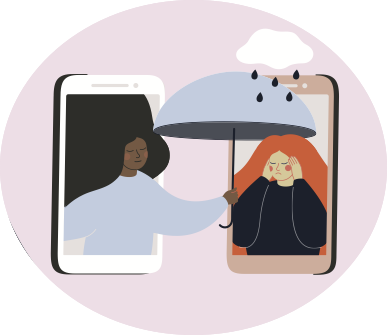How To Talk — And Listen — To A Teen With Mental Health Struggles
 If you are worried about a teenager you care about, here’s how to start the conversation and when to get professional help.
If you are worried about a teenager you care about, here’s how to start the conversation and when to get professional help.
Spot the red flags
Beyond loss of function, which could include sudden and severe changes in eating, sleeping, or even basic hygiene, red flags could include language about wanting to hurt yourself or not wanting to be around anymore.
Elisa Nebolsine, a cognitive behavioral therapist in Falls Church, Va., adds that depression manifests itself in talk that is PPP — personal, pervasive and permanent. Personal, meaning they’re internalizing whatever’s going wrong and experiencing it as a personal flaw. Pervasive, meaning the bad feelings cross many areas of their lives from school to socializing. And permanent, like E., who told us, “Everything is hard because there’s no end to it.”
Validating and modeling
“The biggest tool in the toolbox of a parent is being able to model,” says Dr. Booth Watkins. “So being able to model resilience, being able to model self-compassion, being able to model mindfulness.” Of course, this means parents need their own support system and self-care practices in place if they want to help their children thrive.
Modeling self-compassion includes what Dr. Booth Watkins calls “the best friend test.” “Would you tell your best friend, ‘that was stupid’?” Probably not, she says, and we should ask our teens not to talk to themselves that way either.
Modeling resilience doesn’t mean belittling or downplaying our children’s concerns. Dr. Booth Watkins says we need to validate and empathize with their feelings about missing a birthday party or a baseball season, even if it seems small in the grand scheme of things. Only then can you move to trying to creatively problem-solve with them.
Excerpted from “How To Talk — And Listen — To A Teen With Mental Health Struggles” on NPR. Read the full article online, or listen to the audio broadcast below:
Source: NPR | How To Talk — And Listen — To A Teen With Mental Health Struggles, https://www.npr.org/2021/03/24/980776808/how-to-talk-and-listen-to-a-teen-with-mental-health-struggles | © 2021 npr
Getting Help
For immediate assistance, the following resources are available 24/7 unless otherwise noted:
- Dial 911 or go to your nearest emergency room or urgent care
- Crisis Text Line: Text BAY to 741741 (Anyone can send a message! Kids, teens, and adults)
- Star Vista’s Crisis Hotline: 650.579.0350
- National Suicide Prevention Hotline: 988
- Uplift Mobile Crisis Team: (408) 379-9085 / toll-free (877) 412-7474
- Alum Rock Mobile Crisis: 408.294.0579
- Lifeline Crisis Chat: crisischat.org
- OnYourMind Teen Chat (M-Th, 4:30-9:30 pm): onyourmind.net
A screening can help you determine if you or someone you care about should contact a mental health professional. CHC teletherapy services are available now. Call or email our Care Managers at 650.688.3625 or careteam@chconline.org to set up a free 30-minute consultation appointment.





